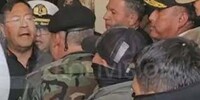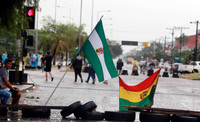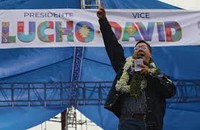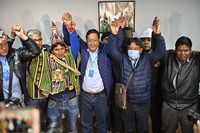Bolivia: la popolazione lotta per la democrazia
The recent crisis that forced the resignation of Bolivia’s second president in less than two years stems from a much deeper problem that is plaguing the entire Latin American region: namely, what is best for the people and who decides?
Bolivians have watched as their politicians courted Enron and other corrupt foreign corporations, and allowed them to take ownership of the country’s most valuable resource – natural gas. As the world’s energy giants were logging record profits, the people of Bolivia were becoming poorer, hungrier and more desperate.
But the part that was hardest for the poor to accept—the final straw—was when they saw their gas being shipped across their borders to their historical arch-enemy, Chile, with the promise that they would somehow benefit, when, yet again, they learned the government was merely finding another way to take a public good and turn it into private profit for a few Bolivians and their corporate and financial backers. (The enmity dates back to 1884, when Chile swiped Bolivia’s only sea-hugging land following the War of the Pacific, leaving the nation landlocked.)
It’s easy to see why the Bolivian people are angry. Despite holding the region’s second largest gas reserves after Venezuela, Bolivia is one of the poorest countries in Latin America. Nearly 65% of the population lives in poverty. Close to 35% of Bolivians lack access to basic electric energy services, a figure that continues to rise even as more gas is pumped out of Bolivian soil.
Two decades of World Bank and IMF prescriptions of austerity and free-market reforms endorsed by Bolivia’s ruling elite have led to reduced government revenues, limiting its ability to provide for citizens’ basic needs. Unemployment is rampant. The La Paz, Bolivia-based Center for Labor and Agrarian Development Studies (known by its Spanish acronym CEDLA) estimates that during the last fifteen years of IMF reforms seven out of 10 new jobs have been in the informal sector. And poverty is not diminishing. According to the World Bank itself, extreme poverty increased 5.8% between 1999 and 2002, and the gap between rich and poor continued to widen.
The situation reached crisis proportion when Bolivians, feeling no improvement in their standard of living, began to ask for their gas back. Although the Bolivian Constitution declares that all hydrocarbons are property of the State, in 1994 to comply with IMF-mandated reforms, Bolivia’s congress enacted legislation to enable the sale of oil and gas concessions to foreign companies, particularly from the U.S. and Europe. All of the country’s gas transportation networks were sold to Enron and Shell. Other corporate winners included Amoco, British Gas, Australia’s BHP, and Petrobras, the government-owned Brazilian oil company.
Sadly, instead of ensuring that Bolivians have access to food, clean water, education, and other basic needs, the World Bank and other development agencies help these private companies build pipelines and exploit Bolivia’s gas for sale outside the country. During Enron’s heyday, 21 government agencies from around the world approved close to $8 billion in public financing for 38 Enron projects in 29 countries – all in less than 10 years. The Inter-American Development Bank, the largest source of development finance for Latin America, approved $132 million for an Enron gas pipeline project in Bolivia one year after the company filed for bankruptcy in the U.S.
The shift of oil and gas revenue from the government’s coffers to private shareholder portfolios did not bode well with Bolivians. Hundreds of thousands of people went to the streets to demand a more equitable share of the benefits. In response, the former U.S. trained president Gonzalo Sanchez de Lozada chose to send in the troops, who killed dozens of people in an attempt to quench the protests. He fled the country and settled comfortably in the United States.
In May 2005, Bolivians were back on the street demanding the very rights that some had died for two years earlier. Sanchez de Lozada’s successor, Carlos Mesa’s now infamous promises following his predecessor’s downfall are known as the October 2003 Resolution, accentuating how long it has taken for the government to do practically nothing. This most recent crisis was sparked when the Bolivian Congress passed a new hydrocarbons law, which despite raising taxes on foreign companies, still failed to ensure that Bolivians had increased control and benefit sharing rights; among the people’s key demands.
Of historical scale, the protests completely paralyzed the capital of La Paz, and managed to make the entire world witness to the will of Bolivia’s disenfranchised. Now with Mesa also shamelessly out of the picture and a third president in power, the international community should make every effort to support Bolivia’s struggle for democracy.
In 1981, following strict adherence to the Structural Adjustments prescribed by the IMF and World Bank, Bolivia’s economy collapsed, resulting in six years of negative economic growth. In 1987 positive economic growth returned to Bolivia but was coupled with tough pressure from the IMF and World Bank to privatize many of its public services in the name of efficiency. In 1993 the pressure materialized through the Sanchez administration: the national airline company was privatized along with electricity, trains, and finally Cochabamba’s water in 1999. The water company was sold to the London-based International Water Ltd. As usual, advocates of privatization argued that a private company would supply water more efficiently and at lower costs.
Instead, the opposite happened. According to a report by Public Citizen, prices tripled and quality and supply problems were quick to follow. Furthermore, for thousands of families, paying for water after the price hikes meant half their salaries. The Bolivian people didn’t hesitate to stand up for their rights then and the result was that in April 1999, the Bolivian government announced the termination of the water contract.
Recent events, not only in Bolivia but also in the rest of Latin America, have shown the extreme unpopularity of measures that favor foreign corporations over the needs of the people, and the lengths to which the poor will go to ensure they are not enacted. They also offer policy-makers an opportunity to reevaluate the current policies and practices of their governments and institutions, particularly in the U.S. Congress should take the opportunity to more closely scrutinize the policies, practices and outcomes of the lending institutions to which taxpayers contribute, such as the World Bank. They should scrutinize, too, how taxpayer dollars are helping to create instability in Latin America and elsewhere, while facilitating the corrupt dealings of presidents, U.S. corporations, and repressive regimes like Sanchez de Lozada’s.
During the 2002 Bolivian elections, when Evo Morales almost became president, the U.S. ambassador Manuel Rocha warned Bolivia that the U.S. was willing to cut its aid and institute an economic blockade if Morales was elected. The elections amounted to a deadlock to be decided by Congress between Morales and Lozada. As the picture worsened in U.S. officials’ eyes, Bush stood behind Sanchez de Lozada and denounced Morales as an unfit candidate, exerting considerable pressure over Congress to elect Lozada. Then, when 86 people were killed in the massacre of 2003 during the first installment of the Gas War, the State Department said: “The American people and their government support Bolivia’s democratically elected president.” Shortly after, news began to surface in the Bolivian press of U.S. involvement in the violent repression. The newspaper Pulso, for instance, reported that the U.S. military command took effective control of the Bolivian army, installing Col. Edward Holland as the head of the operation along with others assigned to troop deployment and logistical support.
In order to prevent further instability, the U.S. should urge the IMF, World Bank and IDB to stop forcing borrowing countries to privatize utilities. It would also help for these institutions to not dictate how borrowing nations structure their budgets. Indeed, these measures have proven to be ineffective and reckless. Furthermore, if the U.S. really wishes to see a stable democracy it should stop threatening Bolivia’s Congress with aid cutoffs and economic blockades whenever it suits its agenda and should immediately cease all funding to local political parties that advance its interests. Development aid should not be provided for fossil fuel projects that undercut poor countries’ ability to supply clean, sustainable energy services to their populations.
Bolivia’s new interim president, Eduardo Rodriguez, has called for early elections, so the country will be going to the polls in a matter of months. It’s unclear what he will do about the urgent and yet unresolved issues such as that of oil and gas, which were the main focus of the protests. Prior to resigning, Mesa tried to address the problems by presidential decree but was attacked from all sides of the political spectrum as unconstitutional. It’s unlikely that any solution will be found until after the upcoming elections, but at least this time, if democracy really works, it will be consistent with the will of Bolivia’s people.
- Nadia Martinez coordinates the Americas program for the Sustainable Energy and Economy Network (www.seen.org), a project of the Institute for Policy Studies in Washington, D.C. (www.ips-dc.org). Juan Montecino is a student at the University of British Columbia in Canada, and her research assistant.
http://alainet.org/active/8744&lang=en
Articoli correlati
 Ancora non si placa la disputa sui fatti del 26 giugno scorso: colpo di stato o autogolpe?
Ancora non si placa la disputa sui fatti del 26 giugno scorso: colpo di stato o autogolpe?Bolivia: l'autodistruzione del Movimiento al Socialismo
La guerra senza quartiere tra il blocco a sostegno di Morales e quello a favore di Arce ha finito per lacerare il partito, i sindacati e i movimenti sociali17 luglio 2024 - David Lifodi Il governatore del dipartimento di Santa Cruz Camacho, ha proclamato uno sciopero a oltranza
Il governatore del dipartimento di Santa Cruz Camacho, ha proclamato uno sciopero a oltranzaBolivia: il ritorno del golpismo
A seguito dello spostamento della data del Censo de Población y Vivienda, l’ultradestra ha promosso tre settimane di sciopero ad oltranza con epicentro il dipartimento di Santa Cruz per destabilizzare il governo di Luis Arce16 novembre 2022 - David Lifodi Il Movimiento al Socialismo dovrà guardarsi dalle manovre di destabilizzazione della destra
Il Movimiento al Socialismo dovrà guardarsi dalle manovre di destabilizzazione della destraLa Bolivia che verrà
«Abbiamo recuperato la democrazia e la speranza» sono state le prime parole pronunciate da Luis Arce dopo la sua elezione25 ottobre 2020 - David Lifodi
Bolivia, dove il popolo ha sconfitto il colpo di stato
Undici mesi dopo la rottura istituzionale risorge la speranza23 ottobre 2020 - Giorgio Trucchi
Sociale.network